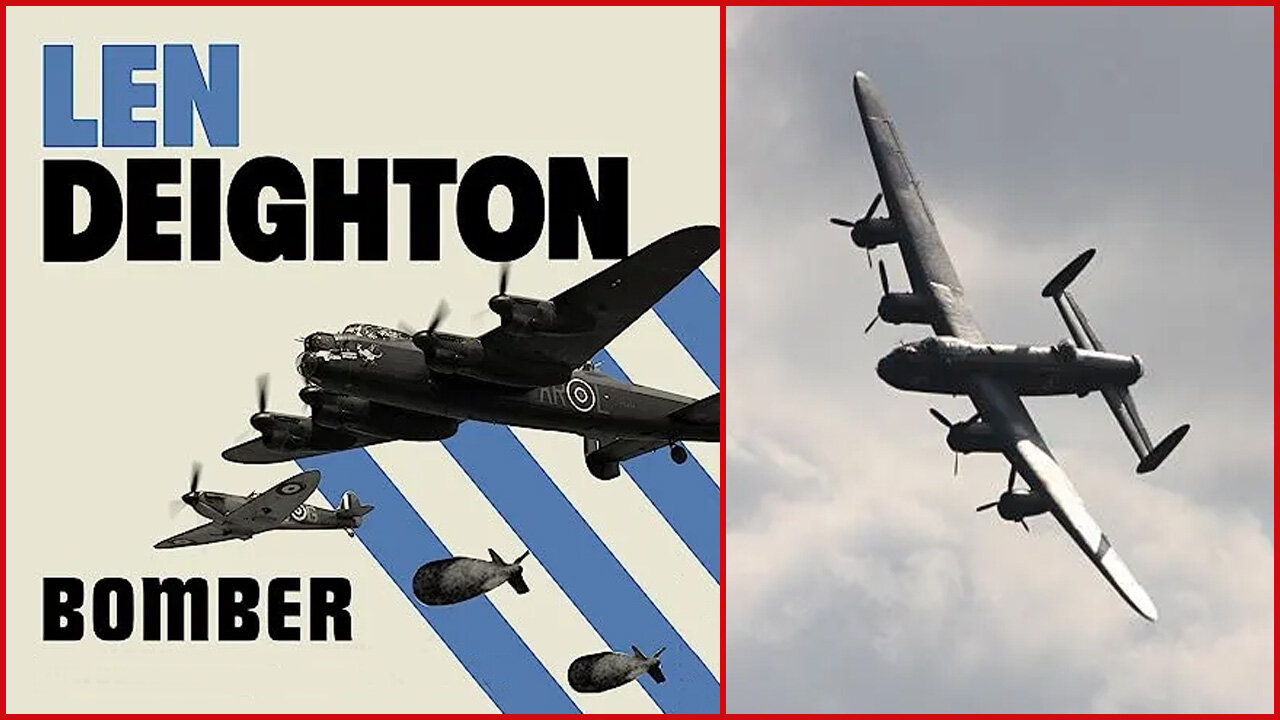Premium Only Content

'Bomber' (1970) by Len Deighton
Len Deighton’s, 'Bomber' is a novel of war, not about glory, but about machinery, bureaucracy, and the cold, methodical destruction that modern conflict makes inevitable. A significant departure from the terse spy thrillers that had made Deighton famous in the 1960s, 'Bomber' is a vast, intricate, and unflinchingly sober portrayal of a single night in World War II — June 31st, 1943 — the date itself fictional, but everything else drawn with almost obsessive authenticity.
The novel is told through multiple viewpoints, both British and German, military and civilian, from pilots and commanders to radar operators, wives, and civilians on the ground. The plot revolves around a fictional RAF bombing raid gone wrong: due to a tragic series of miscommunications and errors, a British Lancaster squadron mistakenly bombs the small German town of Altgarten rather than its intended industrial target. The result is the decimation of a civilian population and the death of many British airmen — not through combat, but through cold inefficiency and human fallibility.
What makes 'Bomber' extraordinary is its structure and ambition. Deighton adopts a documentary-like narrative, influenced by his background in military history. Every chapter moves with precision across different times and perspectives, and the narrative is nearly real-time, spanning the day of the mission. The reader is pulled into operations rooms, aircraft cockpits, command centres, and civilian homes — an omniscient yet intimate look at a single night’s chaos. The sheer number of characters — none of them truly central — reinforces the anonymity of war. Names blur, roles overlap, and what emerges is a chilling portrait of a machine larger than any of its parts.
Stylistically, Deighton forgoes sentimentality. The prose is lean, technical, even clinical at times, reflecting the dehumanising apparatus of aerial warfare. He pays as much attention to radar frequencies and engine design as to human emotion — and that is the point. The bombing campaign is not heroic. It is procedural. Men fly and die not because they are brave or foolish, but because the system demands it. Decisions are made based on maps, weather, and timing, not conscience. The German civilians, far from being demonised, are depicted with sympathy — farmers, families, and children — their destruction a tragic mistake with no villain, just circumstance.
This moral ambiguity — and Deighton’s refusal to offer simple answers — is central to the novel’s power. Unlike conventional war stories, 'Bomber' does not pit good against evil, nor does it celebrate sacrifice. It presents the war machine as an indifferent and often incompetent beast, chewing up everyone caught in its gears. The British airmen are not lionised; they are tired, bureaucratically constrained, and often unsure of the larger purpose of their missions. The Germans are not caricatures but human beings, just as subject to fate and miscalculation.
From a technical standpoint, 'Bomber' was groundbreaking. It was one of the first novels to be written on a word processor — an IBM MT/ST — which Deighton used to manage the immense scope and multiple narrative threads. This innovation allowed him to juggle the complex timelines and perspectives that would have been near-impossible to track using traditional methods. The result is a work of both narrative and technological precision.
If there is a criticism of 'Bomber', it is that its emotional resonance is often buried beneath its clinical detail. The characters, numerous and lightly sketched, are hard to attach to individually. But this detachment is arguably intentional: Deighton is writing about systems, not heroes; about the tragic mathematics of war, not personal courage. The emotional weight accumulates not through individual arcs, but through cumulative dread — as the pieces fall into place and the disaster unfolds in slow motion.
Conclusion: 'Bomber' is not a conventional war novel, nor is it an easy read. It demands patience, attention, and a willingness to forgo the comforting binaries of good and evil. But it rewards the reader with a deeply intelligent, morally serious, and technically masterful exploration of modern warfare. In its breadth and precision, it ranks as one of Len Deighton’s most important works — a novel that strips away the myths of war to reveal the tragic mechanics underneath. Few books have captured so well the impersonal horror of aerial bombing — and the quiet, bureaucratic failures that lie behind history’s loudest explosions.
-
 17:11
17:11
Nikko Ortiz
13 hours agoIs Poverty Your Fault?
6.42K8 -
 41:10
41:10
The Connect: With Johnny Mitchell
4 days ago $6.84 earnedInside The Sinaloa Cartel's Fight For Survival: How Mexico's Oldest Cartel Is Making It's Last Stand
35.5K15 -
 1:44:47
1:44:47
Side Scrollers Podcast
1 day agoKimmel RETURNS + Twitch University + More! | Side Scrollers
56.2K8 -
 5:43
5:43
GritsGG
1 day agoBest Way To Get Specialist EVERY Game!
28.6K2 -
 LIVE
LIVE
Lofi Girl
2 years agoSynthwave Radio 🌌 - beats to chill/game to
283 watching -
 6:48
6:48
Buddy Brown
12 hours ago $12.02 earnedWatch What Happens When you Set up a "Charlie Tent" at HBCU! | Buddy Brown
159K66 -
 3:02:05
3:02:05
FreshandFit
13 hours agoObese Black Girls Got Triggered Over THIS...
115K98 -
 2:07:44
2:07:44
Inverted World Live
9 hours agoPentagon Says it Solved UFO Cases, Tyler Robinson "Roommate" Missing | Ep. 113
47.5K18 -
 2:30:00
2:30:00
Badlands Media
15 hours agoDevolution Power Hour Ep. 392: Psyops, Paper Tigers, and the Path to Sovereignty
97.3K20 -
 3:02:08
3:02:08
TimcastIRL
9 hours agoLeftist Terror Attack On ICE In Dallas, Jimmy Kimmel Doubles Down Insulting MAGA | Timcast IRL
353K142